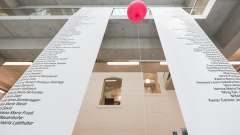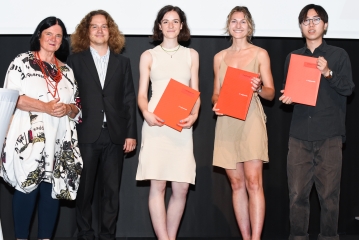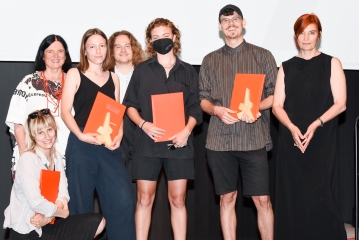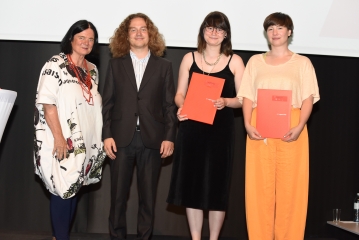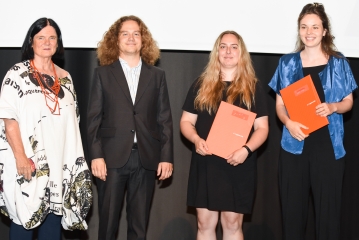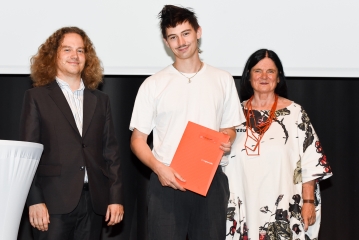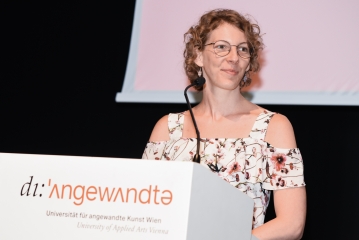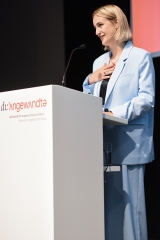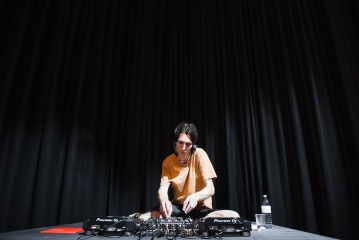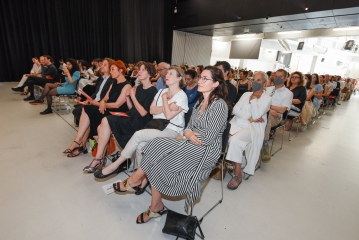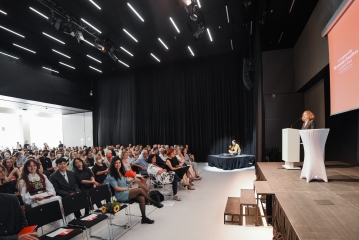07. Juli 2022
Am 1. Juli begingen unsere
Absolvent*innen feierlich ihren Studienabschluss.
Auditorium und Atrium der Vorderen Zollamtsstraße 7 waren Ort des festlichen
Abschieds für Graduierte, deren Familien und Freunde, Lehrende und die teilhabenden Mitarbeiter*innen der Universität.
Die
Festfolge
der Sponsion / Promotion 2022 beinhaltete in diesem Semester auch
den persönlichen Rückblick auf das Studium aus Absolvent*innensicht
von
Johanna Christina Teufel, die das Studium Cross-Disciplinary Strategies abschloss und ihre Gedanken dazu
in einer Rede mit den Anwesenden teilte. Diese wollen wir hier für alle zugänglich machen:
„Liebe Mitstudierende,
sehr geehrter Rektor und Lehrende, Familien und Freunde und Freundinnen und alle, die heute da sind.
Ich
stehe heute hier als Absolventin eines Studiums das es vor fünf Jahren noch gar nicht gab. Der Studiengang „Cross-Disciplinary
Strategies: Applied Studies in Art, Science, Philosophy and Global Challenges“. Ein Studium, dessen Name schon so lang ist,
dass ich die Rede darüber auch einfach jetzt sofort wieder beenden könnte, weil der eh schon alles sagt.
Ich
stehe heute hier, habe endlich meinen Abschluss und kann trotzdem nicht sagen „Ich bin.“ Nach diesem Studium kann man nicht
sagen „Ich bin Künstlerin. Ich bin Ärztin. Ich bin Filmemacherin. Ich bin Forscherin, Wissenschafterin, usw.“ man ist nichts
von alledem. Doch eine Sache sagt der Name des Studiums tatsächlich ganz eindeutig, er ist auf Englisch. Daher wird die folgende
Rede auch auf Englisch sein.
Für alle, die kein Englisch sprechen – ich lade Sie dazu ein – versuchen
Sie sich zu entspannen und nehmen Sie sich die folgenden Minuten für sich. Das Wichtigste über dieses Studium hat der lange
Name und diese wenigen Sätze gerade eben ohnehin fast schon zusammengefasst.
I was invited to speak today,
about the programme I just finished. "Cross-Disciplinary Strategies” Since the title is already so long, let’s just call it
“CDS” for the next few minutes. Even though I have finished CDS, I cannot formulate a sentence with "I am". I can't say "I
am an artist. I am a doctor. I am a filmmaker. I am a researcher, scientist, etc." I am none of that, and to be honest I do
not know what I am now, at all.
For me, that is sometimes very hard to grasp. Especially today, when
I am proudly announcing "I have finished my studies... " everyone keeps asking "and what comes next? Where will you work?
What are you gonna study next?"
Yet, what is actually much more interesting is not what comes next, but what
came BEFORE the graduation?
After finishing school me and a friend took the train to Vienna to check out
the different universities. Suddenly, my mobile buzzed. Message from Mom. She sent me an article. "University of Applied Arts
opens new degree programme: Cross-Disciplinary-Strategies" Upon closer reading, it became immediately clear. Wow. That’s the
perfect degree. A study programme that is exactly one thing: everything and nothing. But what was to expect? Why should I
study that?
Because nowadays, people and societies are more connected than ever before. The 21st century is characterized
by Global Challenges: Climate Change, inequality and war. A peaceful existence on the planet, needs to be based on the co-creation
of knowledge. And CDS at the Angewandte embraces cross-linked thinking.
Sitting in this train I thought one thing: That’s
quite a big programme.
However, when I then started studying it, many things were immediately less "big".
I expected bright, high, big rooms, like here. But as I went to the uni for the first time an office complex awaited me.
Office, office, open-plan office. I went into a room where there were 25 chairs. Soon there were also 25 students, but there
were no desks anywhere. And they wouldn't arrive for some time. But - who needs desks to study anyway? It soon became clear:
the missing desks were metaphorical for quite a few things.
Studying something new also means that it really
is completely new. A lot of things are not there yet and have to be figured out.
We hadn‘t even quite started
yet, but still we already had to re-invent ourselves completely. Personally, I got a glimpse behind the scenes as a
part of the student representatives. Shaping the programme together with the staff and the faculty, became our first cross-disciplinary
challenge, and it involved quite a few struggles.
The struggles derived from the fact that the programme
aims to educate graduates who understand something about every discipline. Who know how to code, how laws are made, how the
world economy works, what plato's philosophical allegory of the cave is, and who cannot only talk about art but also make
art.
But – let’s come to the point: what is the key element? Angewandte. The key element of cross-disciplinary
work is that just theory is never enough. We can‘t just say something „smart“, we also have to prove it in real projects.
Everything we do, needs to be Angewandte. It needs to be put into practice.
But this doesn’t come without
challenges. You can try something over and over again on paper, however, if you put it into practice, it suddenly doesn’t
work out anymore. Nevertheless, this failure is important. If theory really wants to have an impact, it needs to stand the
test of practice. Because scientists keep presenting solutions for the complex and terrible crises of our time. War, climate
change, rising prices, a pandemic and much much more. But after presenting their solutions, their job as a scientist is more
or less done. And this becomes a huge problem: There is a division between theory and practice. And this division needs to
be bridged
With all these challenges we are facing in the world, it is completely absurd to stand here and
talk about it in such a technical and theoretical way. It not only feels wrong, it is wrong. Therefore, I need to mention
this: all of us here today carry responsibility. As do the politicians we elect. We must demand, that theory and practice
are not divided. We must demand for change and for scientific solutions within policies.
Arts play an important
role when fighting the division between theory practice, too. The arts can be the tool for building bridges.
Yes. Art can be a tool indeed. A tool to bring creativity into the most uncreative spheres, a tool to change perspectives
and to connect people.
For this creativity to unfold, art must find its way into all parts of society.
Therefore, we need to ask ourselves: Are we doing enough as a university, to get into the center of society?
Are we doing enough, to be more inclusive and to reach out to students from every corner of society. The process of reinventing
ourselves as a university, will never be done.
But before we continue to do that, we need to celebrate. All
of us sitting here today have helped to shape and to contribute to this university. We have made it. We are graduates. I congratulate
you all from the bottom of my heart and I say thank you for allowing me to be a part of such a creative and exciting community.
I thank all those who made it possible for us to study, and especially those who fought for us continue doing so during this
world wide pandemic and who never tired of reminding us of our goals.
Ich möchte mich bei allen bedanken,
die uns das Studium hier ermöglicht haben, die uns in dieser Pandemie beigestanden sind und sich dafür eingesetzt haben, dass
wir trotz alledem studieren und heute auch abschließen können. Ich gratuliere allen Absolventen und Absolventinnen von Herzen
und wünsche ihnen alle noch einen wunderschönen Sponsionstag! Thank you for your attention!"An dieser Stelle
wünschen wir allen Absolvent*innen alles Gute für ihren weiteren Werdegang und im Besonderen die Möglichkeit Erlerntes einzusetzen,
zu erproben, zu erweitern und zu erschließen! Herzliche Gratulation!




